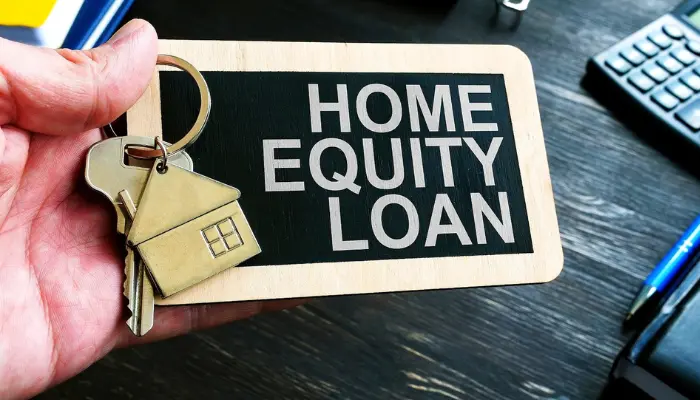How Home Equity Loans Work and Who Can Qualify
If you’ve ever wondered how to get a loan with lower interest rates and an amount that actually makes a difference, this is for you.
Advertisement
The home equity loan — as it’s known out there — is one of the most attractive options in the U.S. market, especially for those who already own a paid-off or nearly paid-off property. And the best part: you can use the money however you want.
Advertisement
In this article, we’ll explain everything: how it works, the risks, benefits, rates, documents, and more. Let’s break it all down in a simple, no-nonsense way?
What is a home equity loan?
Basically, this type of loan works like this: you use your house or another property as collateral to borrow money. The bank or lender will evaluate how much your property is worth and lend you a portion of that value.
Advertisement
In the United States, this model is very common and has a well-known name: home equity loan or HELOC (which is a credit line based on the value of your property).
The amount you can borrow varies, but it’s usually up to 80% of the home’s value minus what you still owe on the mortgage (if it’s not fully paid off).
For example: if your home is worth $200,000 and you still owe $50,000, the bank may lend you up to $110,000 (80% of $200,000 = $160,000, minus the $50,000 debt).
How does a home equity loan work?

Alright, you got the general idea… but how does this kind of loan actually play out? Don’t worry — it’s pretty straightforward once you follow the steps. The process is simple, but every stage matters to make sure you get a good deal.
The bank will evaluate your home’s value, check your financial background, calculate how much they can lend you, and if everything looks good, they deposit the money straight into your account.
And the best part: you can use that money however you want — pay off debts, renovate your home, invest in a project, or even fund a trip.
Here’s how it works, step by step:
- Property evaluation – The bank checks how much your house is worth on the market.
- Financial profile analysis – This includes credit, income, and stability.
- Loan amount definition – The amount depends on your home’s value and how much of it you’ve already paid off.
- Contract and collateral – Your property stays in your name, but it becomes legal collateral until the loan is fully paid.
- Funds release – Once everything’s approved, the money hits your account.
Oh, and a good thing: the money can be used for anything — paying off debt, investing in your business, fixing up your house, or even covering your kids’ education.
What are the advantages of this type of loan?
If there’s one thing that makes home equity loans stand out, it’s the combo of benefits they offer. It’s not just about lower interest rates — there’s a lot that makes this a smarter option than other credit types, like credit cards or personal loans. Check it out:
- Lower interest rates – Since your property is used as collateral, the bank takes on less risk. That means better rates for you.
- Higher loan amounts – Great for those who need a bigger loan, like over $30,000.
- Longer repayment terms – Can go up to 15, 20, or even 30 years.
- Freedom to use the money – You decide how to spend it.
- Possibility of deducting interest on taxes – If the money is used for home improvements, in some cases you can deduct it on your IRS return.
In short: this type of loan is for those who want to fix their finances without falling into a trap. But of course, always with responsibility.
And the risks? Should you be concerned?
Yes. It’s not all sunshine and rainbows — the risk is real: you can lose your house if you don’t pay. It’s kind of an “all or nothing” deal. That’s why it’s super important to think things through, plan ahead, and be sure you can handle the payments.
Another thing: depending on the economy, your home’s value could drop. If that happens, you might end up owing more than the house is worth — the famous “underwater mortgage.”
Only take out this kind of loan if you truly need it and have a solid plan to repay it.
Who can apply for a home equity loan?
Alright, you liked the idea and now you’re wondering if you’re eligible. The good news is that a lot of people do qualify, but there are some requirements that banks usually follow before approving the credit.
To increase your chances of approval, you’ll need to:
- Be over 18 years old – No minors allowed in the process.
- Have a decent credit score – Usually above 620 points, and the better your credit history, the better the loan terms.
- Show proof of stable income – This can be a salary, retirement benefits, pension, or self-employed income. The point is: you need to prove you can make the payments.
- Have at least 15% to 20% of the home paid off – That means you’ve already built a decent chunk of equity.
- Be current on your taxes and mortgage – No late payments or issues with the government or your lender.
And yes, even if you’re still paying off the house, you can still apply. What matters is that you’ve already built up a solid amount of equity. If your home is fully paid off, even better — more room to get a bigger loan.
What type of property can be used as collateral?
The good news is you don’t need a mansion to get a home equity loan. You can use different types of properties — what really matters is that the property is legally documented and in good condition.
Here’s what banks usually accept:
- Residential home – If you live in it, even better. This is the most common type.
- Apartment – Also accepted, as long as it’s paid off or has available equity.
- Mobile home – Some banks accept it, but it depends on their policies and the home’s structure.
- Commercial property – Storefront, salon, warehouse… can be used as collateral too.
- Second home or vacation property – That little beach or country house? Yep, it can help unlock a good loan.
The key is: the property must be in your name (or in the name of whoever’s signing with you), with no legal issues, all paperwork in order, and in solid condition. The more “clean” it is, the easier it is to get approved.
How much can you get with a home equity loan?
This is the question everyone wants answered, right? And the truth is: it depends. The amount the bank will release is directly tied to how much your house is worth today and how much of it you’ve already paid — your equity.
Most lenders in the U.S. allow you to borrow between 70% and 80% of the property’s market value, but they factor in what you still owe on your mortgage (if any). That part gets deducted before they approve the loan amount.
To make it easier, here’s an example:
- Your home is worth: $300,000
- You still owe on the mortgage: $100,000
- Your equity (the part that’s yours): $200,000
- The bank allows up to 80%: 80% of $300,000 = $240,000
- Minus what you still owe: $240,000 – $100,000 = $140,000 available
So in this case, you could borrow up to $140,000. Not bad, right?
But keep in mind: each bank has its own rules, so this number might vary a bit up or down. The best move is to compare offers from different lenders to find the best deal for your situation.
Interest rates and terms: are they really good?
Yes! The interest rate is one of the biggest perks. While a personal loan might charge 10% to 20% per year, a home equity loan usually falls between 5% and 8% annually — sometimes even lower.
On top of that, the longer repayment terms make the monthly payments a lot easier to manage.
How long does it take to get the money?
If you’re counting on that cash, it’s totally normal to wonder: “Okay, but when does the money hit my account?” The answer is: it’s not instant, but it usually doesn’t take too long either.
Once you’ve submitted all your paperwork and the bank finishes evaluating your home, the average time for the funds to be released is between 7 to 15 business days. But it can vary depending on a few factors, like:
- How fast they analyze your credit
- The property inspection schedule
- If all your documents are in order
- Whether the bank has faster or slower internal processes
To speed things up, the trick is to have everything ready from the start: income proof, deed, personal documents, and whatever else the bank asks. The less back-and-forth with paperwork, the faster that money lands in your account.
What documents are required?
To get a home equity loan, there’s no way around some bureaucracy — but don’t worry, it’s not rocket science. Most banks just need basic documents to confirm who you are, how much you earn, and that the property is really yours.
Here’s what you’ll usually need to show:
- Photo ID – Could be your driver’s license or another valid ID.
- Proof of income – This can be a pay stub, bank statement, or tax return — anything that shows you have a stable income.
- Proof of residence – A utility bill works, as long as it shows your name and current address.
- Property documents – Includes the deed, updated appraisal, and in some cases, homeowner’s insurance.
- Credit history – You don’t need to bring this; the bank will check your credit report during the process. But it’s good to have an idea of where you stand.
If you have all this ready from the beginning, the whole process goes a lot faster and with way less stress.
Can I use someone else’s property?
Some banks allow it, as long as the property owner is fully aware and signs the contract as a co-signer. But it’s not very common. Most lenders prefer that the property be in the name of the person applying for the loan.
Can I pay off the loan early?
Yes, you can! And the best part: usually without penalties. In fact, paying it off early can save you money on interest. Just double-check the contract to see if there’s any prepayment fee.
Can I refinance later?
If your property’s value goes up or you’ve already paid off a good chunk of the loan, yes — you can refinance. That means replacing your current loan with another one under better conditions or even getting extra cash.
Home Equity vs. Mortgage: is there a difference?
Yes, and a lot of people get confused, since both involve houses, banks, and borrowing money. But they’re quite different, and knowing the difference can save you from trouble later.
Here’s the breakdown:
- Mortgage: This is the loan you get to buy the house. It’s that long-term financing you pay monthly. The house itself is the collateral, and you pay it off little by little.
- Home Equity Loan: This is a second loan, taken out after you’ve already paid off a chunk of your home. The bank lends you a new amount based on how much of the home you own. You keep paying the mortgage (if you have one), and now also repay this new loan.
- HELOC (Home Equity Line of Credit): This works more like a credit limit, similar to a credit card, using your home’s value as the base. You withdraw what you need, when you need, and only pay interest on what you use.
To sum it up: a mortgage is to buy a house, a home equity loan is to get money using the house you already own, and a HELOC is for those who want flexible funds to tap into when needed.
Which banks offer this type of loan in the U.S.?
If you’re thinking about getting a home equity loan, don’t worry — there’s no shortage of options out there. You’ll find everything from big traditional banks to modern fintechs that let you do everything online without even leaving your house.
Here are some of the main banks that offer this type of loan:
- Wells Fargo – One of the biggest in the country, offering multiple home equity options and in-person service at branches.
- Bank of America – Another well-known name, offers both home equity loans and HELOCs with competitive rates.
- Chase – A good pick if you’re already a client and want convenience when applying.
- U.S. Bank – Offers long-term plans and personalized support.
- Rocket Mortgage – A more digital option, perfect if you prefer handling everything online quickly.
- LoanDepot – Focused on home lending, including options for those with fair credit.
- Navy Federal Credit Union – A great option if you’re in the military or a family member of someone who is.
And besides traditional banks, there are fintechs too — they’re gaining ground by simplifying the process and offering a fully online experience. Some of the most well-known are:
- Better – Simple, straightforward, and with very competitive rates.
- Figure – Specializes in home equity loans with super fast approval.
- SoFi – A favorite among younger people, focused on tech and practical service.
The tip here is: compare everything before choosing — check rates, terms, conditions, and customer service. Each bank operates a little differently, so it’s worth shopping around to find the one that fits your profile and financial goals best.
Step-by-step guide to getting a home equity loan
If you’ve made it this far and think this kind of loan could be a good fit for your life — great! But before you start signing anything, it’s important to understand exactly how the process works — step by step, no stress.
The good news is, you can handle everything smoothly as long as you know where to begin. So here’s a practical guide to follow and avoid falling into any traps along the way:
- Check the value of your property – Use websites like Zillow to get an estimate.
- Calculate your available equity – Subtract your mortgage balance from your home’s market value.
- Organize your documents – Income proof, ID, and property paperwork.
- Research financial institutions – Compare interest rates, loan terms, and reputations.
- Request a simulation – Ask for proposals and see which one fits you best.
- Choose the best offer and sign – Read everything carefully before committing.
- Receive the money and use it wisely – Plan things out so you don’t get overwhelmed later.
Is a home equity loan worth it?
It depends on your goal. If you’re looking to pay off high-interest debt, invest in something important, or renovate your home, this could definitely be a smart move. But going in with a solid plan and financial discipline is a must.
If you’re unsure whether you can keep up with the payments, or if it’s just to cover non-essential expenses, you might want to think twice.
A home equity loan is a powerful tool — but like any tool, it needs to be used the right way. It can help you get your finances in order, but if you’re not careful, it can also turn into a headache.
So before anything else, evaluate, simulate, compare — and only go forward if you’re 100% sure of what you’re doing.





